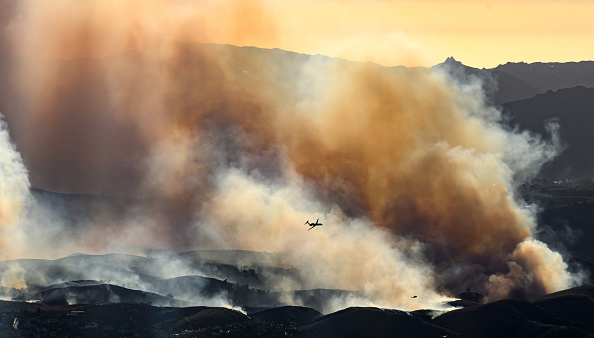
(NewsNation) — As multiple wildfires continue to scorch tens of thousands of acres in the Los Angeles area, people face dangerous air quality levels and exposure to smoke inhalation.
The U.S. Department of Health and Human Services declared a public health emergency Friday.
Dr. David Hill, board chair of the American Lung Association, joined “Morning in America with Hena Doba” on Saturday morning to discuss the health risks of smoke inhalation.
“These are widespread fires producing a lot of smoke that’s toxic, and it’s a danger to the entire public,” Hill said. “Everyone breathes, so this is something everyone, particularly in the greater Los Angeles area, has to be taking seriously.”
What are the risks of smoke inhalation?
There are both short-term and long-term risks.
The short-term risks include lung injury, particularly for high-risk groups.
“This is not just wood smoke that’s burning. There are dangerous chemicals in houses and in schools and industrial facilities and all these buildings that are burning that are very toxic,” Hill said.
High-risk groups include children, pregnant women, the elderly and anyone with preexisting conditions, such as lung disease, heart disease or diabetes.
“But again, anybody who’s breathing this toxic smoke is at risk.”
Long-term risks include a higher rate of asthma, worsening lung and heart disease and other complications.
“These particles are so small that they get deep into the lungs and cause inflammation and can also pass directly into the bloodstream and cause problems,” Hill said. “So, we see an increased risk of Parkinson’s disease of cognitive decline, which is why everyone needs to limit their exposure to this to the best degree.”
How to protect yourself from smoke inhalation
Per Hill’s recommendations, people in smoky areas should do the following:
- Evacuate when urged or ordered to do so
- Pay attention to air quality indexes
- Stay indoors as much as possible
- Set air conditioning to recirculation when leaving home or another building
- Keep windows closed
- Close any fireplaces
- Run central A/C if it’s available
- Wear an N-95 mask if going outside
“A cloth mask is not going to stop these particles from getting into your lungs,” Hill said. “N95 and N100 masks are necessary.”
Wildfire smoke can travel long distances.
“Even though you may not be under an evacuation order, it does not mean your air quality is going to be good locally.”
Hill urged people to pay attention to air quality indexes available online at airnow.gov.







